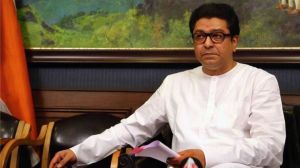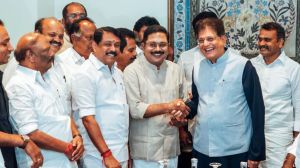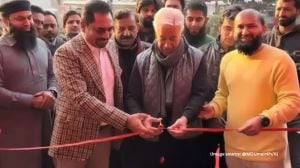Where lantern gleams
In the last lap of the Bihar polls, the BJP-JDU is pulling out all the stops. From a star-studded podium at Patna on Friday evening, all t...

In the last lap of the Bihar polls, the BJP-JDU is pulling out all the stops. From a star-studded podium at Patna on Friday evening, all the visiting leaders 8212; A.B. Vajpayee, Jaswant Singh, Arun Jaitley, Pramod Mahajan 8212; attacked the ruling couple. They dismissed Paswan 8212; 8216;8216;he doesn8217;t even know his mind8217;8217; 8212; and promised Nitish Kumar would deliver a 8216;8216;nootan Bihar8217;8217;. Nobody bothered to spell out what the new government would do to drag Bihar out of the mess it is in. As speculation of a hung Assembly hangs heavy, there is only one agenda: Derision of Laloo.
In Central Patna, where rickshaws are the fastest growing mode of transport and where the noise in the street is mixed with the constant groan of generators, derision of Laloo is not confined to Opposition rallies. Patna8217;s Hindi press has written off Laloo so many times in the past that local journalists play cautious. But they will count out the reasons why Laloo is in trouble after 15 years.
First, the Muslim vote is cracking up because the community feels used. The Yadavs have cornered the land and the thekedaris. In the last 10 years, Dalit Muslim organisations have also become more active.
Secondly, the Yadav vote is splintering because of an explosion of ambition in the community8217;s ranks. There are too many Yadav wannabe-MLAs for the RJD to accommodate. This time, the Independents number 2,357 of the 3,193 candidates 8212; up by nearly one and a half times from the 2000 Assembly polls 8212; and they are predominantly Yadav.
Third, Laloo was the chance beneficiary of the caste polarisation following Mandal and then the communal divide after Babri. This time, local issues dominate the polls.
But just a little distance from Central Patna, in rural constituencies, the mood changes. Danapur and Maner are Yadav-dominated constituencies and Phulwari is a reserved constituency with a dominant Muslim vote. Here, Laloo8217;s supporters still manage to dominate tea stall discussions. Even after 15 years.
All three constituencies offer pictures of poverty and neglect. None boasts of any industry 8212; the only sugar mill in Bihta was shut about 25 years ago. The roads are barely motorable, power cuts span 8 hours or more. In the office of NGO Ekta Parishad at Danapur, Pradeep Priydarshi admits the 8216;8216;blind faith8217;8217; in Laloo is a thing of the past. But he explains, 8216;8216;Lekin prasad nahin mila, is liye hum mandir nahin tod denge We don8217;t destroy the temple just because we didn8217;t get a share of the offerings.8217;8217; The exit polls broadcast by the media, he adds, will help consolidate the pro-Laloo vote in the last round.
In a wayside tea stall at Danapur, Vikas Singh, erstwhile 8216;8216;honours student8217;8217;, now an RJD activist, quickly draws a crowd around us as he shouts down questions on Laloo8217;s record. Laloo will win, he explains, there is no alternative. 8220;Development is also about opening up political channels to the underprivileged. Politicisation also counts as development. Nobody8217;s asking for more in Bihar. Nobody8217;s ever seen better here,8221; he emphatically rests his leader8217;s case.
A little distance from the crumbling walls of Phulwari8217;s only high school, Ward Commissioner Mohammed Kaushal Khan feels Laloo will lose some of the Muslim vote because there is no BJP threat at the Centre. But he still bets on Laloo: 8216;8216;That suits us. Muslims can force a weaker Laloo in power to pay more attention to their demands.8217;8217;
Nearby, in the office of a Dalit NGO, Kapileshwar Ram sits under a poster that proclaims Ek nai duniya sambhav hai Another world is possible. He doesn8217;t hide his disillusionment: 8216;8216;Laloo didn8217;t keep his promises to the Dalits8230;where is the assured land for housing?8217;8217; But he can still identify with Laloo: 8216;8216;At least he speaks our language.8217;8217; Even after 15 years.
- 01
- 02
- 03
- 04
- 05































